Breaking Bad Breakdown: Exiling Evil
We’ve known that this was coming for quite awhile. Since “Live Free or Die” aired 14 months ago, we’ve known that Mr. Lambert would be leaving New Hampshire to settle some scores. That knowledge has structured our anticipation for everything that has come so far in this extended season 5, with the lingering question of how Walt ends up relocated in New Hampshire framing all of the events in New Mexico. So after last week’s hour of emotional torture, this week focused on connecting the dots from Walt leaving his family and city, to setting up his return from exile. While I wouldn’t call it a low-key episode, it felt downright mellow compared to “Ozymandias.”
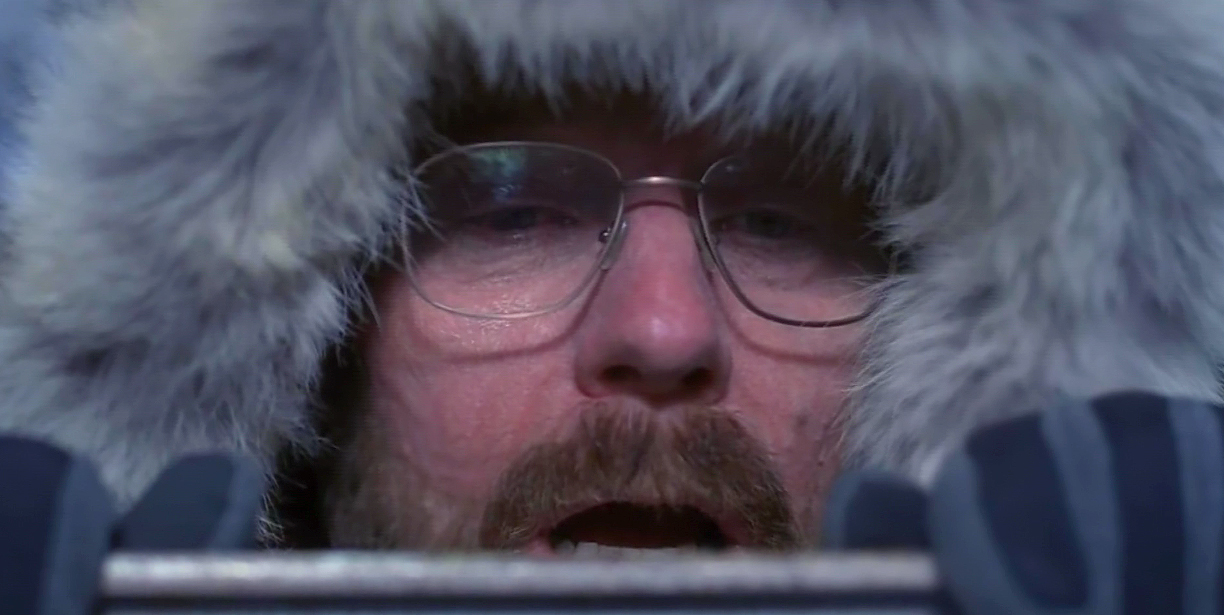
Even though we know he will return to Albuquerque, the journey into Walt’s New Hampshire exile is sufficiently agonizing. He is forced to fume in the basement of the vacuum repair store, under the care of the unnamed guy who knows Saul’s guy, played with steely professional perfection by Robert Forster. He tries to bully Saul back into working for him, but Saul takes his ticket to Nebraska and leaves with an anticlimactic, “it’s over.” Forster sets him up in an isolated cabin which is effectively worse than going to jail—permanent solitary confinement with no connection to the outside world, lacking medical care beyond what can be gleaned from a YouTube video, trapped with a barrel full of money but no way to spend it. While pathetically wasting away knowing that his family is suffering for his sins, the best Walt can do is extend his monthly delivery by paying Forster $10,000 for an extra hour of human contact.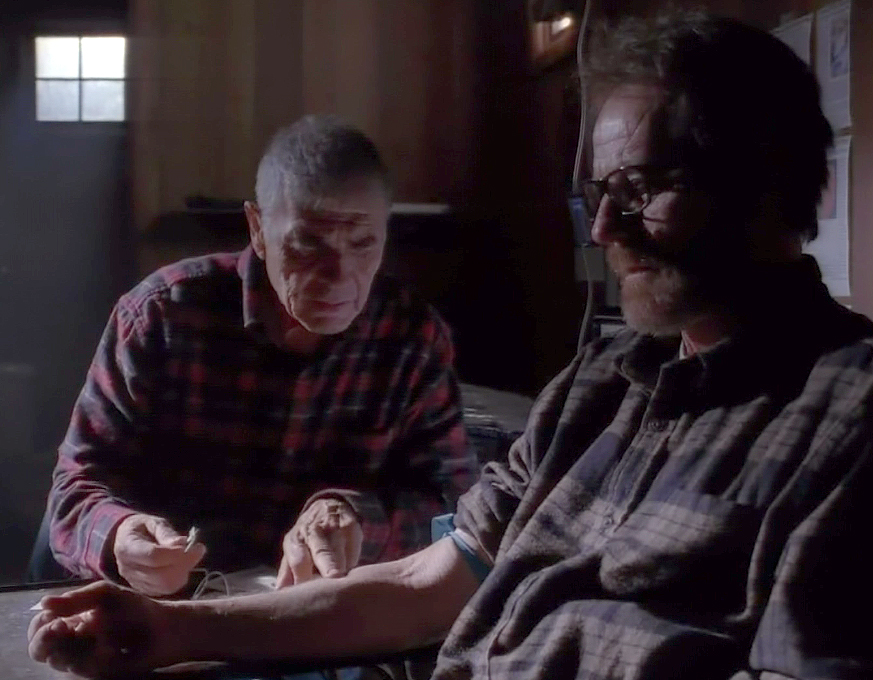
“Granite State” was an unusually structured episode—even though it was an extra 15 minutes long, it still felt oddly compressed and limited. We got ample time to be told the limits on Walt’s exiled existence, but no time to really experience what life might be like for him. With a larger episode order, we might have gotten an episode that served as the parallel to “Fly,” with Walt trapped in a wide-open space and no sidekick to spar with—imagine a really dark remake of Castaway. But what I liked best about the structure was how we got to experience the publicity frenzy over the Hunt for Heisenberg solely from Walt’s highly limited perspective of monthly newspaper clippings. Now that Hank is gone, we have no hook into law enforcement’s perspective, so we’re left only with Walt’s disorienting confusion in being unable to play mouse to the DEA’s cats. This meant that we fast forwarded through a few months without much knowledge of Skyler or Marie’s situation, which I missed, but it works well to convey Walt’s lack of knowledge and sense of total helplessness and isolation. It’s all almost enough to make you feel bad for the poor bastard.
Almost. When he finally does get the wherewithal to leave his compound to send his family a package of money, Walt flexes his old manipulative cleverness to call Flynn and arrange the delivery. But in a cathartic scene, Flynn tells his father where to stick his money and puffed up rationalizations about doing it all for the family; this pushback highlights how Saul’s sage advice that turning himself in would have actually been a much better deal for Skyler and the kids, but of course such conventional defeat is unacceptable to Walt. Again, R.J. Mitte gets some meaty action in these final episodes, offering the world’s most justified petulant teenager rant against a parent.
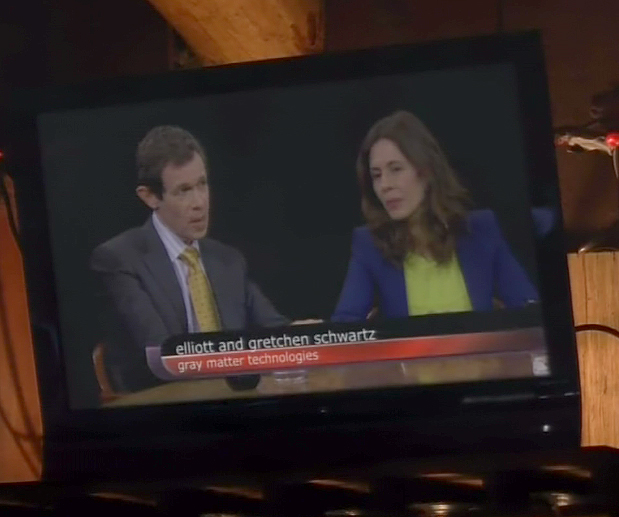 Walt follows this familial rebuke with his first television viewing in months—which coincidentally includes Charlie Rose interviewing his former business partners Elliot and Gretchen. I’ll forgive this contrivance, as I was just so happy to see them return as a reminder of what has long fueled Walt’s quest to build an empire: spite, retribution, and pride. The television presents a string of slights that pick at the scabs of his emotional wounds: his contributions to Gray Matters being presented as “no more and no less” than the company name, Gretchen saying that Walter White is gone and replaced by some monster, and word that Heisenberg Blue is still on the streets and therefore Jesse is probably alive and sullying his reputation. And such whiskey shots of humiliation, served neat, are enough to provoke Heisenberg to return to action, connecting the dots to the flashbacks and setting the endgame in motion for the final episode.
Walt follows this familial rebuke with his first television viewing in months—which coincidentally includes Charlie Rose interviewing his former business partners Elliot and Gretchen. I’ll forgive this contrivance, as I was just so happy to see them return as a reminder of what has long fueled Walt’s quest to build an empire: spite, retribution, and pride. The television presents a string of slights that pick at the scabs of his emotional wounds: his contributions to Gray Matters being presented as “no more and no less” than the company name, Gretchen saying that Walter White is gone and replaced by some monster, and word that Heisenberg Blue is still on the streets and therefore Jesse is probably alive and sullying his reputation. And such whiskey shots of humiliation, served neat, are enough to provoke Heisenberg to return to action, connecting the dots to the flashbacks and setting the endgame in motion for the final episode.
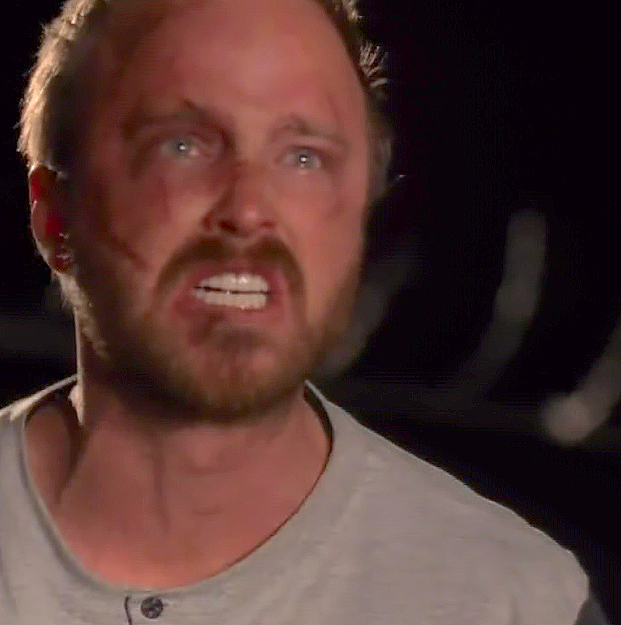 Of course Jesse is alive, but just barely. I was disappointed in Jesse’s storyline this week, where he is being tortured even more by the writers than by his Nazi captors. I will reserve judgment until next week, as it feels like the calamities are piling up to create a glorious payoff of redemption for poor Jesse (please please please!), but pretty much every episode this half-season could be summed up by repeating “poor Jesse” endlessly. Watching Todd gun down Andrea (although it wasn’t personal, he assures her!) as a punishment for his attempted escape was simply the latest and worst way that his sensitive soul was ripped apart for other people to manipulate him. Poor, poor Jesse.
Of course Jesse is alive, but just barely. I was disappointed in Jesse’s storyline this week, where he is being tortured even more by the writers than by his Nazi captors. I will reserve judgment until next week, as it feels like the calamities are piling up to create a glorious payoff of redemption for poor Jesse (please please please!), but pretty much every episode this half-season could be summed up by repeating “poor Jesse” endlessly. Watching Todd gun down Andrea (although it wasn’t personal, he assures her!) as a punishment for his attempted escape was simply the latest and worst way that his sensitive soul was ripped apart for other people to manipulate him. Poor, poor Jesse.
The other main criticism of this season is that too much time has been spent with Todd, Lydia, and Jack’s gang, but I found this episode paid off those arcs remarkably well. Ever since Walt killed Mike and took over sole control of the business, Walt found himself allied with far worse colleagues than Mike, Jesse, Gus, Gale, or maybe even Tuco. When Walt retired from his drug empire, his former colleagues came to embody the worst elements of Heisenberg: Todd is distilled, unremorseful menace in a polite candy coating, while Lydia is pure, uncut greed in high-strung heels, and the two together in the café was just a sociopathic delight. For someone obsessed with chemical purity, Walt always had emotional soft spots that could cloud his judgment and actions; Lydia, Todd, and their band of neo-Nazis are pure in their determination, focus, and actions, emerging as the refined amoral byproduct of Walt’s personal chemical transformation that he fails to control in the final season. Lydia’s quest to continue the business because no amount of money is ever enough is the same logic that led to Walt’s storage locker full of cash. Todd and Jack’s belief in White Supremacy is the legacy of Walter White’s supremacy—they reek havoc on his family through the chilling scene where Todd threatens Holly as a sociopathic extension of Walt’s own use of Holly as a bargaining chip last week, and destroy his extended surrogate family through the torture of Jesse and murder of Andrea. These are the forces that Walt unleashed that he cannot control, at least not without a machine gun.
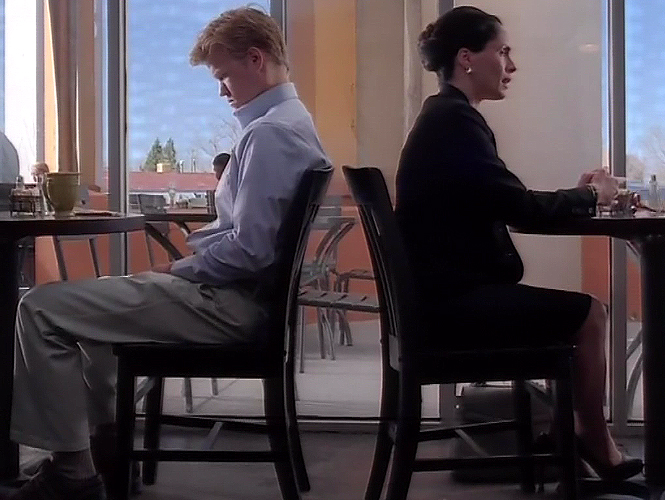
The introduction of these bigger bads in the final season could be setting up a huge copout, where Walter redeems himself by killing the monsters that he conjured. But I’m hopeful that the series knows how unredeemable Walt is, and refuses the easy path toward a moral realization—and the reemergence of Elliot and Gretchen is a good clue that the scores Walt hopes to settle are not the same that the audience might be rooting for.
I left “Ozymandias” ready for Breaking Bad to end, feeling that two more hours of emotional torture was more than enough. Now with only one episode left, I’m nervous about how this might all wrap-up in a way that justifies the series that I feel I’ve been watching. Of course every one of the program’s season finales thus far has been brilliant (save for the unintended finale of strike-shortened season one), so I have faith that the set-up will be paid off in unexpected but rewarding ways. Yet a little nagging doubt remains, leaving me to stew for a week as I think about who might be the target of Walt’s arsenal of machine gun and ricin, and what fate I hope befalls this horrible man. See you then.
Random Packages of Ensure™:
- In addition to Elliot and Gretchen’s much appreciated return, which I had half been expecting (although not with Charlie Rose), the surprise curtain call of the episode was Carmen, the Assistant Principal whom Walt awkwardly attempted to kiss back in the third season. While she didn’t get anything to do, it’s always nice to be reminded that regular people still exist in this world.
- Skyler, as played ferociously by Emmy Winner (!!!) Anna Gunn, had little to do this episode, again confined to the role of reacting to other people’s prompts. With the police, she was stuck with no way out of the numb, disorienting hole that Walt dug for her. In the episode’s most disturbing scene, Todd’s threats to Holly raised her hackles, but she was forced to parrot his demands to back her into even more of a corner. I do hope that the finale offers Skyler one last moment of agency, as she has earned more than perpetual victimhood.
- Wouldn’t you love to see a scene between (should-have-been Emmy Winner) Jonathan Banks and Forster, two old pros sitting at the bar comparing notes on what a rancid piece of shit that Walter White is?
- “Mr. Magorium’s Wonder Emporium? Two copies.”
- One of the most pleasurable moments in this season came at the end of the episode, as the musical cue incorporates Breaking Bad’s theme music as the cops search for Walt in the bar. The moment evokes the mood of a full-tilt Western crime caper, but also reflexively calls our attention to the series itself, coming to an end in a climactic moment signaled by the familiar sounds of slide guitar.
- – Like many viewers, I toggled between Breaking Bad and the Emmys last night. While Banks was robbed and Michelle MacLaren was unduly denied by David Fincher’s big cinematic reputation, Anna Gunn’s win was so deserved as a validation for how much she has suffered as both a character and actress. And the joy of the whole team accepting the long overdue recognition of the series as television’s Best Drama helped buffer the sorrow inflicted by “Granite State.”
Paratext of the Week:
My favorite bit of Breaking Bad criticism this week was Todd VanDerWerff’s piece on the show’s racial politics, articulating what I have long argued: the series is about white male privilege, not simply reiterating it. I’d even take it a step further by emphasizing how the character names (White and Pinkman) highlight their typically unmarked racial identity, and that the result of Walt’s selfishness is fueling white supremacy, but it’s great to see such analysis in a high-profile site like Salon.
And for a more upbeat way to end, Hank lives!



[…] Jason Mittell dissects the penultimate Breaking Bad episode in his Breakdown column for Antenna. [UWMadison] […]
I dunno — as a fan of this series, I think they finally lost me just as the show was wrapping up. “Granite State” is, in my opinion, the worst episode of the season (5a and 5b), and has me worried about a satisfying conclusion. While “Ozymandias” was an amazing piece of work (and “To’hajilee” before it), “Granite State” felt simultaneously rushed and dull, and too beholden to a plot that no one really cares much about.
Let me explain — the killing of Andrea was unnecessary, gratuitous, and just eye-rollingly manipulative. It’s the killing of one of the only “normal” characters on the show, one who hasn’t been a real presence on the series since the 3rd season, purely as a way to make the already-abused Jesse even more… abused? Perhaps there’s some other payoff for this move coming, but it seems intended to (1) show us that “creepy Todd” is still, surprise, creepy Todd; and (2) give Aaron Paul another scene where he has to deal with another enormous loss (as though him being imprisoned in a ludicrous Nazi meth lab isn’t enough).
I dunno, I guess I see the machinations of the 5th season plot as sapping the show of what it should be about at this stage: the conflicts between Walter and his two “families.” Instead, it seems to me like they dug themselves a hole in “Live Free or Die” by having a flashforward & Chekhov’s M60 — one they admittedly had no idea how they were going to work their way to when they wrote it — and now the last two episodes after Hank’s death and the knife conflict have to be about getting us to that point. Since it was never likely that Walter was going to go after Skyler, Marie, or Junior with the M60, we end up with moustache-twirling Nazis (really?) and Todd/Lydia, who seems just as much of a caricatures as the other Big Bads, just more polite/twitchy.
In retrospect, I wish they would have killed off Hank in 5a, like Dean Norris had requested. It would have given them more time and space for a “Fly”-like episode (great idea, Jason) for “Granite State” and given us ore of an extended denoument that focused on the characters, rather than on setting up a Scarface-like ending. I hope the finale is not what they’ve been hinting it will be, I really do, “Granite State” made the puppet strings far too visible, and now I just want it to be over rather than have to deal with more hamfisted “Hey, see how we killed off another person Jesse loves! Isn’t it just terrible?!” writing.